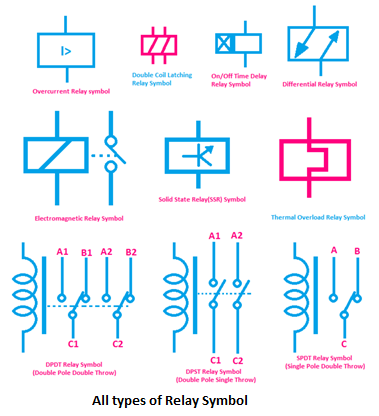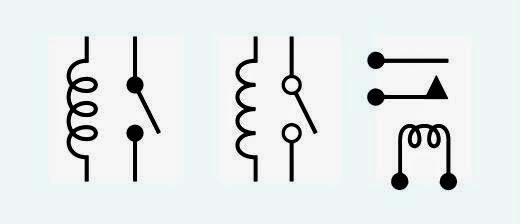Understanding Relay Symbols in Electrical Circuits

Imagine controlling a high-power circuit with a small switch, almost like a lever that amplifies your control. That's the essence of a relay. But how do we represent this powerful component in the complex world of electrical diagrams? This is where the symbol of the relay comes into play.
The relay symbol acts as a visual shorthand, a crucial piece of the language of circuit design. It represents the physical relay, allowing engineers to quickly understand its function and how it interacts within the larger circuit. Understanding these symbols is essential for anyone working with electrical circuits, from students to seasoned professionals.
Relay symbols have evolved over time, mirroring the development of relay technology itself. Early representations were often more pictorial, evolving into the more standardized, abstract symbols we use today. This standardization ensures clear communication and minimizes the risk of misinterpretations, which are critical in complex systems.
The importance of using accurate relay symbols can't be overstated. Imagine trying to decipher a complex circuit diagram without a clear understanding of the components involved. The relay's symbol removes ambiguity, allowing for efficient troubleshooting, design, and maintenance of electrical systems. It bridges the gap between the physical component and the conceptual design.
There isn't just one single universal relay symbol. Variations exist to represent different types of relays, such as latching relays or time-delay relays. These variations often incorporate additional markings or symbols to indicate specific functionalities. Learning these nuances allows for a more detailed understanding of the circuit's behavior.
Historically, relays were crucial in telegraphy and early telephone systems, acting as amplifiers and switches for long-distance communication. Their symbolic representation allowed engineers to design and maintain these complex networks, ushering in a new era of communication technology. Today, relays are still integral to various applications, from industrial automation to automotive systems.
A basic relay symbol typically comprises a coil and a set of contacts. The coil represents the electromagnet, and the contacts symbolize the switching mechanism. Simple examples include normally open (NO) contacts, which close when the relay is energized, and normally closed (NC) contacts, which open when the relay is energized.
The use of standardized relay symbols offers numerous benefits. First, it facilitates clear communication between engineers, eliminating potential confusion. Second, it simplifies the design process, enabling engineers to visualize and plan circuits more effectively. Third, it aids in troubleshooting and maintenance, allowing technicians to quickly identify and address issues.
A common challenge in using relay symbols is understanding the various types and their corresponding representations. Consulting comprehensive resources like electrical engineering handbooks or online component libraries can help overcome this hurdle. These resources typically provide detailed explanations and diagrams for different relay types.
Advantages and Disadvantages of Standardized Relay Symbols
| Advantages | Disadvantages |
|---|---|
| Clear communication | Requires learning different symbol variations |
| Simplified design process | Potential for misinterpretation if not standardized |
| Efficient troubleshooting |
Best practices for using relay symbols include adhering to established standards, clearly labeling all components, and providing detailed documentation. This ensures clarity, reduces errors, and facilitates future maintenance or modifications.
Real-world examples of relay use include controlling high-power motors, switching lights in automated systems, and protecting circuits from overloads. Understanding the corresponding relay symbols is essential for working with these systems.
Frequently asked questions revolve around the different types of relay symbols, their interpretations, and their applications in various circuits.
Tips for working with relay symbols include utilizing software tools for circuit design, referencing standardized symbol libraries, and practicing reading and interpreting complex diagrams.
In conclusion, the symbol of the relay in electrical circuits is far more than a simple marking on a diagram. It’s a powerful tool that facilitates communication, simplifies design, and ensures the smooth operation of complex electrical systems. From its historical origins in telegraphy to its modern applications in automation, the relay symbol has played a vital role in shaping our technological world. By understanding its nuances and best practices, we can unlock the full potential of this essential component and continue to innovate in the field of electrical engineering. Explore resources, delve into the different variations, and embrace the language of circuit design – you'll find that mastering relay symbols opens a world of possibilities in electrical engineering.
The shadowy history exploring the longevity of gangs
Conquer garage floor chaos with water mats
Wedding day wisdom navigating your big day with grace













